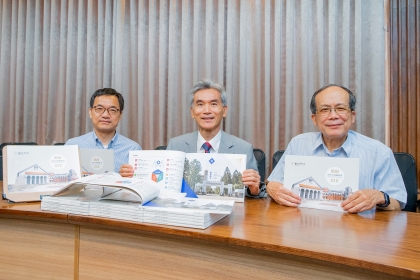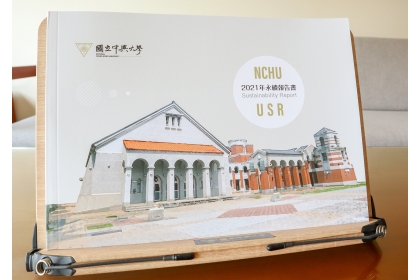National Chung Hsing University Issues 2021 Sustainability Report for Sustainable Campus Development
2022-07-05 18:01:56
興新聞張貼者
Unit秘書室
1,527
National Chung Hsing University published its 2021 Sustainability Report in June this year, with the purpose of conveying to the general public the specific results of the university's efforts on university governance, social participation, and environmental governance on the basis of sustainable development. The report this year was prepared according to the GRI Standards, indicators for the education industry announced by the Sustainability Accounting Standards Board (SASB), and the Task Force on Climate-related Financial Disclosures (TCFD). Ernst & Young Taiwan provided assurance for the contents of the report. The Sustainability Report will continue to be regularly published in the future, and will be announced on the website of National Chung Hsing University USR Information Platform (https://usr.nchu.edu.tw/sustainability) for browsing and downloading.
Vice President Jenn-Wen Huang of National Chung Hsing University serves as the convener for the report, and called together member of the administrative unit, teaching unit, and various research centers to form a task force. The report discloses material issues and the latest information on economic, environmental and social issues that have a major impact on the university's sustainable development, serving as reference for people from all walks of life. The book is divided into 6 chapters, introducing information about National Chung Hsing University, university mission and vision, university governance, social participation, environmental governance, and related appendices.
The SDGs and net zero emissions by 2050 began to trend in Taiwan last year, and the first COVID-19 outbreak in Taiwan peaked last May. This report focuses more on the university's courses, research, services, and declarations relating to sustainability initiatives, net zero emissions, and carbon neutrality, and also describes the impact of COVID-19 and response measures. President Fuh-Sheng Shieu said that "seeing what society needs and using expertise to meet society's needs" is the key role of universities in global sustainability. Looking towards the future, National Chung Hsing University will not only increase its capabilities internally, but also integrate resources of industry, government, and academia to make greater contribution to Taiwan's society as well as international society. The university hopes that more and more partners with the same ideals will join it on the path to sustainability, and achieve sustainable industries, sustainable cultural assets, sustainable ecology, and sustainable environment.
Vice President Jenn-Wen Huang of National Chung Hsing University serves as the convener for the report, and called together member of the administrative unit, teaching unit, and various research centers to form a task force. The report discloses material issues and the latest information on economic, environmental and social issues that have a major impact on the university's sustainable development, serving as reference for people from all walks of life. The book is divided into 6 chapters, introducing information about National Chung Hsing University, university mission and vision, university governance, social participation, environmental governance, and related appendices.
The SDGs and net zero emissions by 2050 began to trend in Taiwan last year, and the first COVID-19 outbreak in Taiwan peaked last May. This report focuses more on the university's courses, research, services, and declarations relating to sustainability initiatives, net zero emissions, and carbon neutrality, and also describes the impact of COVID-19 and response measures. President Fuh-Sheng Shieu said that "seeing what society needs and using expertise to meet society's needs" is the key role of universities in global sustainability. Looking towards the future, National Chung Hsing University will not only increase its capabilities internally, but also integrate resources of industry, government, and academia to make greater contribution to Taiwan's society as well as international society. The university hopes that more and more partners with the same ideals will join it on the path to sustainability, and achieve sustainable industries, sustainable cultural assets, sustainable ecology, and sustainable environment.



